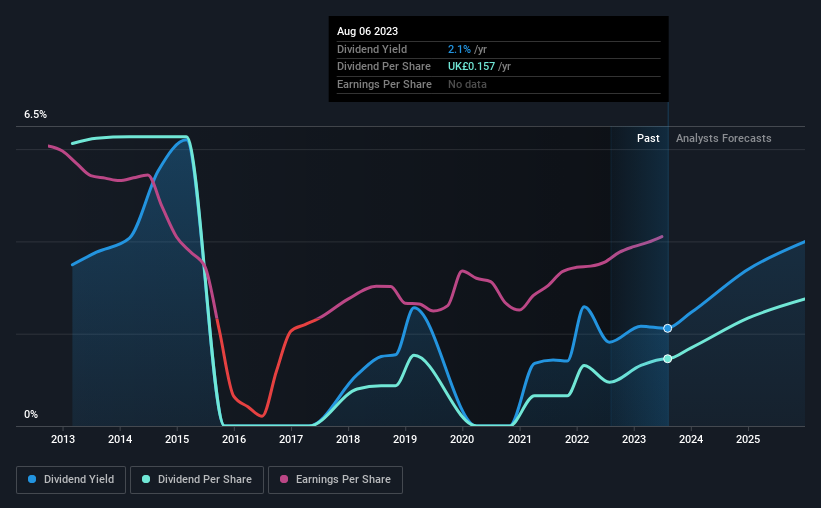Stock Analysis
- United Kingdom
- /
- Banks
- /
- LSE:STAN
There's A Lot To Like About Standard Chartered's (LON:STAN) Upcoming US$0.06 Dividend

Standard Chartered PLC (LON:STAN) stock is about to trade ex-dividend in 3 days. The ex-dividend date is one business day before the record date, which is the cut-off date for shareholders to be present on the company's books to be eligible for a dividend payment. The ex-dividend date is important because any transaction on a stock needs to have been settled before the record date in order to be eligible for a dividend. In other words, investors can purchase Standard Chartered's shares before the 10th of August in order to be eligible for the dividend, which will be paid on the 13th of October.
The company's next dividend payment will be US$0.06 per share, and in the last 12 months, the company paid a total of US$0.20 per share. Calculating the last year's worth of payments shows that Standard Chartered has a trailing yield of 2.1% on the current share price of £7.416. Dividends are a major contributor to investment returns for long term holders, but only if the dividend continues to be paid. As a result, readers should always check whether Standard Chartered has been able to grow its dividends, or if the dividend might be cut.
Check out our latest analysis for Standard Chartered
If a company pays out more in dividends than it earned, then the dividend might become unsustainable - hardly an ideal situation. Standard Chartered paid out just 20% of its profit last year, which we think is conservatively low and leaves plenty of margin for unexpected circumstances.
When a company paid out less in dividends than it earned in profit, this generally suggests its dividend is affordable. The lower the % of its profit that it pays out, the greater the margin of safety for the dividend if the business enters a downturn.
Click here to see the company's payout ratio, plus analyst estimates of its future dividends.

Have Earnings And Dividends Been Growing?
Companies with consistently growing earnings per share generally make the best dividend stocks, as they usually find it easier to grow dividends per share. If earnings decline and the company is forced to cut its dividend, investors could watch the value of their investment go up in smoke. It's encouraging to see Standard Chartered has grown its earnings rapidly, up 34% a year for the past five years.
The main way most investors will assess a company's dividend prospects is by checking the historical rate of dividend growth. Standard Chartered's dividend payments per share have declined at 13% per year on average over the past 10 years, which is uninspiring. Standard Chartered is a rare case where dividends have been decreasing at the same time as earnings per share have been improving. It's unusual to see, and could point to unstable conditions in the core business, or more rarely an intensified focus on reinvesting profits.
The Bottom Line
Is Standard Chartered an attractive dividend stock, or better left on the shelf? Typically, companies that are growing rapidly and paying out a low fraction of earnings are keeping the profits for reinvestment in the business. This is one of the most attractive investment combinations under this analysis, as it can create substantial value for investors over the long run. Overall, Standard Chartered looks like a promising dividend stock in this analysis, and we think it would be worth investigating further.
Ever wonder what the future holds for Standard Chartered? See what the 20 analysts we track are forecasting, with this visualisation of its historical and future estimated earnings and cash flow
A common investing mistake is buying the first interesting stock you see. Here you can find a full list of high-yield dividend stocks.
Valuation is complex, but we're helping make it simple.
Find out whether Standard Chartered is potentially over or undervalued by checking out our comprehensive analysis, which includes fair value estimates, risks and warnings, dividends, insider transactions and financial health.
View the Free AnalysisHave feedback on this article? Concerned about the content? Get in touch with us directly. Alternatively, email editorial-team (at) simplywallst.com.
This article by Simply Wall St is general in nature. We provide commentary based on historical data and analyst forecasts only using an unbiased methodology and our articles are not intended to be financial advice. It does not constitute a recommendation to buy or sell any stock, and does not take account of your objectives, or your financial situation. We aim to bring you long-term focused analysis driven by fundamental data. Note that our analysis may not factor in the latest price-sensitive company announcements or qualitative material. Simply Wall St has no position in any stocks mentioned.
About LSE:STAN
Standard Chartered
Provides various banking products and services in Asia, Africa, the Middle East, Europe, and the Americas.
Adequate balance sheet and fair value.

